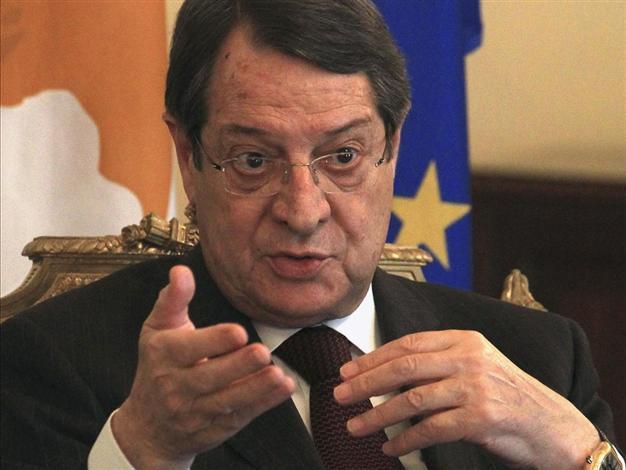Greek Cypriot president says gas find may help resolve Cyprus division
NICOSIA

Cypriot President Nicos Anastasiades speaks during an interview with Reuters in Nicosia, April 9. REUTERS Photo
Greek Cypriot President Nicos Anastasiades said discovery of natural gas around Cyprus could galvanize international efforts to resolve a long-standing division of the island and smooth development of an alternative energy supply source to Russia.But he said it was too early to speak of tangible progress in recently relaunched peace talks on the ethnically split island. Deep differences persisted between rival Greek and Turkish Cypriots that have defied the efforts of diplomats and politicians over four decades.
Almost one trillion cubic meters of recoverable natural gas has already been discovered in the eastern Mediterranean Levant Basin, enough to supply Europe with gas for over two years. Anastasiades said the discovery and the potential prosperity it could bring to countries in the region brought the need for peace into sharper focus.
“It is important for Europe and the United States,” he told Reuters in an interview on April 9. “Europe will never stop needing Russian gas but there can be alternative supply sources,” Anastasiades said.
European states have become wary of heavy dependence on Russian energy since Moscow’s annexation of Ukraine’s Black Sea Crimea peninsula last month. Russia provides around one third of the European Union’s oil and gas. But division of the island and competing territorial claims could complicate development of the new fields, which extend also towards Israel.
Turkey disputes Greek Cyprus’s rights to a swathe of sea to the island’s south and southeast that are rich in gas reserves. Greek Cyprus says the waters are part of its own offshore area, where it has awarded research concessions to France’s Total, U.S. company Noble Energy and South Korea’s Kogas.
Two senior U.S. State Department officials have visited the island over the past two months, lending support to Anastasiades’s call for “bold” confidence building measures.
Anastasiades said confidence building measures could go a long way in restoring faith in the process among a public jaded with peace initiatives that have come and gone over the decades. “People are tired, disappointed from a non-solution,” said Anastasiades.
“At this point the initial positions of the sides are being submitted, so it would not be possible to expect any so-called progress,” said Anastasiades. “Progress is the fact that we are back in a dialogue, with a framework which we must all focus on, so that negotiations do not deviate from that framework.”
Turkish Cypriot President Derviş Eroğlu and Anastasiades agreed in February to relaunch peace talks on the basis of an agreed agenda, calling for the creation of a partnership under a federal umbrella in tune with EU standards.
“There is a gap in our positions, a gap in the positions of the Turkish side and even more so from the European acquis,” Anastasiades said, referring to EU rules and regulations. He said that any impression given by Turkish Cypriot negotiators that the sides were at a bargaining stage were ‘false.’
“I’m not saying this to accuse anyone, or to enter a blame game...I wish it were like that, but we are not there.”
















